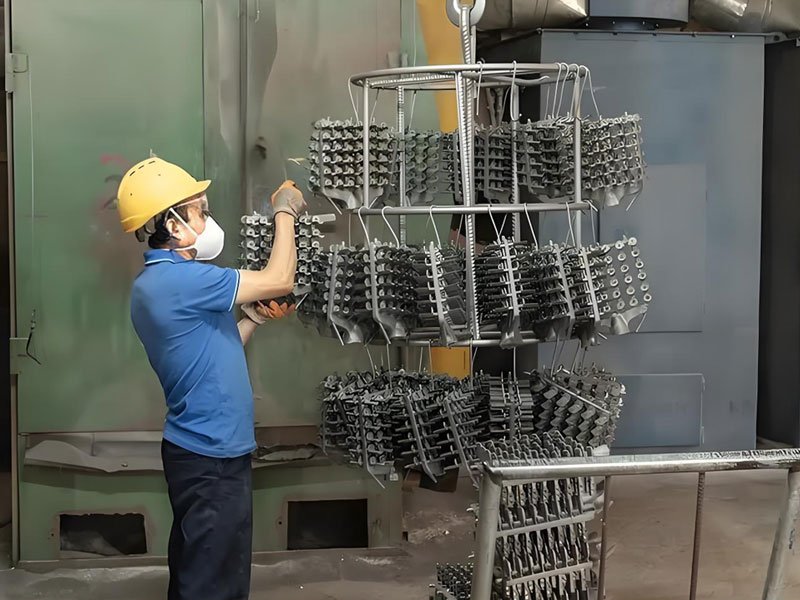1. What is casting?
Metal casting is a manufacturing technique in which molten metal is poured into a mold (sometimes called a compression mold) and cooled until it is completely solidified. The solid metal part is then removed from the mold. In most cases, a secondary finishing process is used to further refine the cast metal part into a finished product.
Depending on the material chosen, the size of the casting, the shape of the casting and various other characteristics, a number of different metal casting techniques can be used. Some of the most popular casting methods include die casting, sand casting, pressure casting and investment casting.

2. Advantages and disadvantages of the Casting.
The following table summarizes the most common advantages and disadvantages of the metal casting process for manufacturers.
- Pros of Casting:
- Can create incredibly complex andunusual shapes, including intricateinternal cavities.
- Potentially faster than machiningfor large production runs, especiallyon complex parts.
- For large production runs, the costper part is comparatively lower.
- Casting with reusable moldsmeans a high degree ofrepeatability, as you can createidentical copies of parts over andover again.
- Is highly efficient. Nearly all metal isused in the part. Any excess metalfrom the pouring process or fromrejected parts can easily be melteddown and recycled.
- Cons of Casting:
- Methods like die casting andprecision investment casting arevery accurate, but CNc machiningis almost always more precise andachieves tighter tolerances.
- For smaller production runs, thecost per part is comparativelyhigher.
- Cast parts often have a longer leadtime to produce because of thetime needed to design and procuremolds.
- Materials selection is very good, butnot as impressively vast asmachining.
- Cast parts often need additionalprocessing, like cutting offunwanted cast material orsandblasting to remove burrs.
3. What is CNC machining?
CNC machining is a subtractive manufacturing process in which a milling machine, lathe, or other machining device is fed into a computer program that controls its operating parameters to selectively remove material from a base metal feedstock. After zeroing in on the part to determine the origin, the CNC machine gradually removes small amounts of metal until the final shape is achieved.
Depending on the context, CNC machining can refer to several different types of machining. This includes traditional machining processes such as CNC turning, milling, drilling, boring, and sawing, as well as modern, non-conventional machining processes such as laser cutting, wire cutting, and abrasive water jet cutting.

4. Advantages and disadvantages of CNC machining.
Machine shops typically utilize a variety of equipment, such as the most common lathes and mills, so that the most appropriate tools are used in the machining process. If this is the most efficient process, it is common for a part to move between multiple equipment stations.
As a result, the table below summarizes the most common pros and cons of CNC machining, as manufacturers can use a variety of suitable CNC machines.
- Pros of Cnc Machining:
- Creates extremely accurate partsthat can meet high precisionquality reguirements.Parts aredimensionally accurate withsmooth surfaces.
- The production time for machiningunique parts or small batches issignificantly faster than casting.
- For small production runs andprototyping, the machining cost perpart is comparatively lower.
- The range of materials suitable formachining is huge.
- Cons of Cnc Machining:
- Cannot easily create internalcavities.
- Cost per part is similar for large andsmall batches,making castingmore cost-effective for largeproduction runs.
- Depending on the part complexityand material used, some parts maytake significantly longer tomachine.This means that for largerbatches, casting may be faster inthe long run.
- It creates more metal waste, whichis also more intensive to recycle,often needing to be shipped off site.
5. Difference between casting and cnc machining:
When comparing casting and CNC machining, both are invaluable methods of metal fabrication.
Die casting is mainly concerned with molds and is responsible for issues regarding product quality. Whereas machining is mainly concerned with the method of machining (drilling, grinding, milling, turning), the range of machine tools, precision and manner of machining.
Understood in another way, casting is one of the ways of molding a product, and what comes out is a blank part. Machining, is taking the rough part made by casting or other methods and post-processing it to the size and finish you need.
This means that choosing the right method depends on your project constraints and final part requirements.


6. Casting VS. Cnc Machining:
Casting and machining have their own advantages and disadvantages in processing technology.
Advantages of casting: you can make complex shapes and large-size workpieces easily, short manufacturing cycle, in mass production when the cost of a single piece is relatively low. Disadvantages: lack of precision, and the casting of internal inclusions, porosity and other defects.
Advantages of machining: high machining accuracy, and can handle different kinds of metal materials, can start quickly, suitable for small batch production. Disadvantages: the cost of mass production is relatively high, and the processing cycle is long.
7. Choose the best processing method
In general:
- CNC machining is the preferred method for prototyping unique parts or for rapid production of small to medium quantities. Choose cnc machining when you have very tight tolerance requirements for part accuracy and surface finish.
- Metal casting is the preferred method for producing large quantities of the same product. It can also be used to produce complex internal cavities that are difficult or impossible to reproduce by other methods.
In some cases, the combination of casting and precision CNC machining is the most efficient and reliable method of producing parts. Parts produced by this method are referred to as machined castings.
In summary, casting and machining have important applications in the processing and fabrication of metal materials, although they differ in process, characteristics, and areas of application.
Either way, Allied Metal has you covered.
We offer reliable, professional die casting, precision investment casting and CNC machining services to help you produce high quality products quickly and economically.